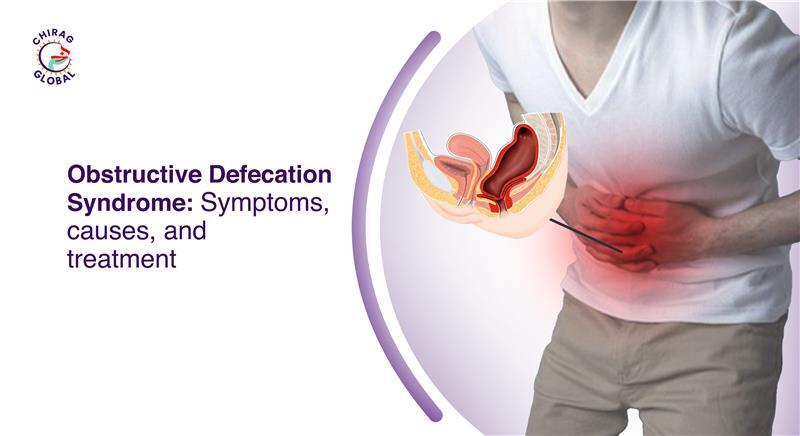Most people experience constipation occasionally, often due to dietary changes, dehydration, or stress. But when bowel movements become consistently difficult despite eating well and staying hydrated, it may indicate a more complex problem. One such condition is Obstructive Defecation Syndrome (ODS).
ODS is not just “ordinary constipation.” It is a medical disorder where the process of passing stool is mechanically or functionally obstructed. Understanding ODS is crucial, as untreated cases can lead to long-term discomfort, complications, and reduced quality of life.
This article provides a clear, medically accurate, and easy-to-follow explanation of ODS — its symptoms, causes, effects on the body, treatments, and prognosis.
What is Obstructive Defecation Syndrome?
Obstructive Defecation Syndrome (ODS) is a type of functional constipation where the problem lies in stool evacuation rather than stool formation. In simple terms, the intestines may be functioning normally, but the body struggles to expel stool due to structural or functional blockages in the rectum or pelvic floor.
ODS is classified under pelvic floor dysfunctions and is more common among women, particularly after childbirth. However, men can also develop the condition.
Unlike occasional constipation, ODS is chronic and often requires medical evaluation and long-term management.
Symptoms of Obstructive Defecation Syndrome
ODS symptoms go beyond simple constipation. Common signs include:
- Straining excessively during bowel movements
- A sensation of incomplete evacuation (feeling like stool is still inside)
- Needing to use fingers (digital assistance) to help remove stool
- Passage of small, hard stools or very thin stools
- Frequent urge to defecate with little output
- Abdominal bloating and discomfort
- Rectal pain or bleeding due to straining
- In severe cases, rectal prolapse (rectum protruding outside the anus)
Key Difference: Ordinary constipation is often temporary, but ODS persists even with dietary changes, hydration, and fibre intake.
If you regularly experience these symptoms, it is important to consult a colorectal specialist rather than self-medicating with laxatives.
What Are Its Causes?
The causes of ODS are usually a combination of structural problems and functional disorders in the rectum and pelvic floor.
1. Structural Causes
- Rectocele: A bulge in the rectal wall into the vagina (common in women after childbirth).
- Rectal Intussusception: The rectum folds in on itself, blocking stool passage.
- Rectal Prolapse: The rectum slips out of its normal position.
- Anal Strictures or Scarring: Narrowing of the anal canal due to previous surgery, trauma, or chronic inflammation.
2. Functional Causes
- Pelvic Floor Dyssynergia: The pelvic floor muscles fail to relax properly during defecation.
- Weak Pelvic Floor Muscles: Often due to childbirth, ageing, or surgery.
- Nerve Dysfunction: Damage to nerves controlling bowel function.
3. Lifestyle & Secondary Factors
- Chronic constipation leads to rectal muscle dysfunction.
- Overuse of laxatives weakens bowel reflexes.
- Pregnancy and childbirth trauma.
- Menopause-related hormonal changes.
ODS is usually diagnosed with specialised tests such as defecography, anorectal manometry, or MRI scans to identify the exact cause.
How Does This Condition Affect the Body?
ODS affects not just bowel movements but also overall health and well-being.
Digestive System Impact
- Frequent straining increases the risk of hemorrhoids and anal fissures.
- Rectal prolapse may develop over time.
- Stool retention can lead to fecal impaction (hardened stool stuck in the rectum).
General Health Impact
- Chronic bloating and abdominal discomfort.
- Increased fatigue due to straining and incomplete evacuation.
- Possible urinary incontinence in women due to pelvic floor weakness.
Psychological Impact
- Anxiety and embarrassment about bowel habits.
- Social withdrawal, avoiding outings due to fear of discomfort.
- Reduced quality of life.
Left untreated, ODS can become severely disabling, making timely medical intervention crucial.
Diagnosis: How It’s Identified
If you experience chronic constipation or pelvic floor symptoms, a doctor, usually a colorectal surgeon, gastroenterologist, or urogynecologist, may evaluate you for DPS.
Common diagnostic methods include:
- Physical examination: Checking perineal descent during straining.
- Defecography (X-ray or MRI): Imaging performed while passing stool to observe pelvic movement.
- Anorectal manometry: Measures muscle function and coordination.
- Endoanal ultrasound: Assesses pelvic muscle structure.
Early diagnosis is key to preventing complications and choosing the right treatment approach.
FAQs about Obstructive Defecation Syndrome
1. Is obstructive defecation syndrome the same as constipation?
No. While both involve difficulty passing stool, constipation is usually due to hard stools or slow bowel movement. ODS is specifically caused by structural or functional problems that prevent stool evacuation.
2. Can ODS be treated without surgery?
Yes. Many patients improve with dietary changes, pelvic floor physiotherapy, and biofeedback therapy. Surgery is only considered if these methods fail.
3. When should I see a doctor for constipation?
See a doctor if:
- Constipation persists for more than 3 weeks.
- You experience severe straining, incomplete evacuation, or rectal bleeding.
- You need manual assistance to pass stool.
4. How do you treat obstructive defecation syndrome?
Obstructed defecation treatment starts with lifestyle changes, including a high-fibre diet and increased water intake, and may include stool softeners or biofeedback therapy. If these fail, surgery such as rectocele repair or stapled transanal resection (STAR) might be necessary. Other therapies include pelvic floor physiotherapy, enemas, or even injections of botulinum toxin for certain causes.
Conclusion
Obstructive Defecation Syndrome is a common but often overlooked cause of chronic constipation. It occurs when structural or functional issues in the rectum and pelvic floor make it difficult to evacuate stool. Chiraayu, an Ayurvedic wing of Chirag Global Hospitals, can be the right solution to Obstructive Defecation Syndrome.
The good news is that ODS is treatable. With early diagnosis, lifestyle changes, physiotherapy, and in some cases surgery, most people can achieve significant relief.
If you or a loved one struggles with chronic constipation, do not ignore the symptoms. Seek advice from a colorectal specialist for accurate diagnosis and treatment.
Visit us to learn more about: Obstructive Defecation Syndrome





Comments